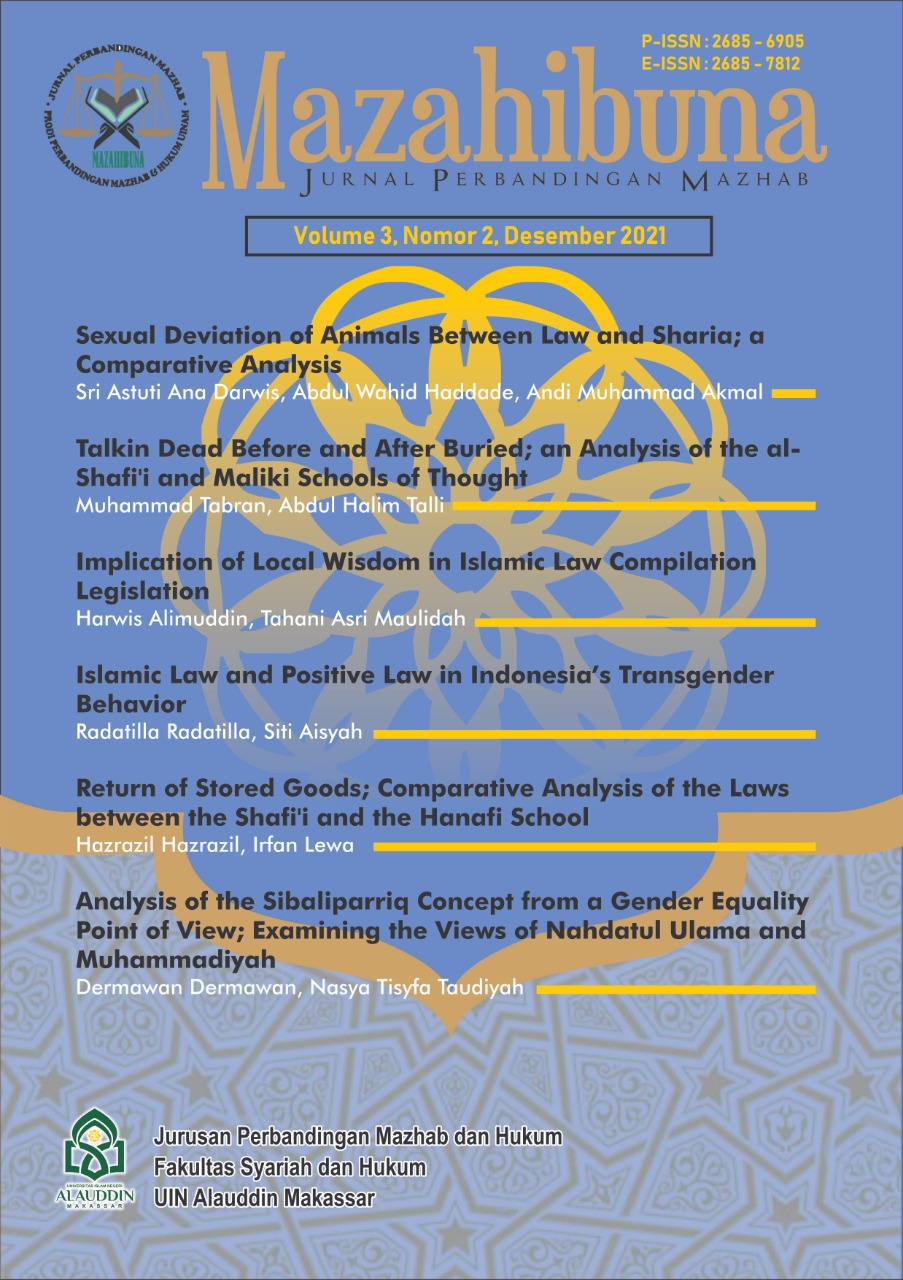Sexual Deviation of Animals Between Law and Sharia: a Comparative Analysis
Abstrak
Bestiality is a form of sexual perversion. Bestiality perpetrators seek sexual satisfaction by making animals objects of sexual satisfaction, which is considered to deviate from legal norms, religious norms, and moral codes that apply in society. This article aimed to discuss the comparison of Islamic law and positive law regarding the sexual perversion of animals. This study employed qualitative with a comparative descriptive research approach. The results of this study indicated differences of opinion between Islamic law and positive law regarding the sexual perversion of animals. Based on the different views of Islamic law in response to this case, some people were allowed, and some were not allowed. Meanwhile, some people stated that the incident must be subject to sanctions and fines from a positive legal perspective. The implication of this study was to prevent bestiality (sexual activity of animals), it is necessary to have strict and concrete rules to protect the next generation of the nation, as a good legal policy as well as renewal of Islamic law and positive law as well as protection of animals. Providing information is very necessary through maximum socialization to the public about the law of consuming animals that humans have fertilized.
Referensi
Arief, Barda Nawawi. Kapita Selekta Hukum Pidana. III. Bandung: Citra Aditya Bakti, 2003.
Arif, Barda Nawawi. Teori-Teori Dan Kebijakan Pidana. Bandung: Alumni, 2005.
Astuti, Laras, and Trisno Raharjo. “Harmonization of Adultery Regulations in Indonesian Criminal Code with Islamic Law.” In 4 International Confrence the Community Development in ASEAN, 416–26, 2017.
Bakry, Muammar, Abdul Syatar, Achmad Abubakar, Muhammad Majdy Amiruddin, and Islamul Haq. “Is It Possible to Perform Online Marriage during COVID-19 Outbreak?” In Procedings of the International Confrence on Ummah: Digital Innovation, Humanities and Economic (ICU: DIHEc). Kresna Social Science and Humanities Research, 2020.
Burn, Shawn Meghan. “The Psychology of Sexual Harassment.” Teaching of Psychology 46, no. 1 (2019): 96–103. doi:10.1177/0098628318816183.
Dan, Hudûd, H A M Artikulasi, Jl Ibn, Sina Darussalam, and Banda Aceh. “PENGGOLONGAN HUDÛD ABDULLAHI AHMED AN-NA ’ IM” XXXV, no. 2 (2011): 372–90.
Haq, Islamul. “Prison in Review of Islamic Criminal Law; Between Human and Deterrent Effects.” Samarah: Jurnal Hukum Keluarga Dan Hukum Islam 4, no. 1 (2020): 132–50. doi:10.1017/CBO9781107415324.004.
Haq, Islamul, M Ali Rusdi Bedong, Abdul Syatar, and Muhammad Majdy Amiruddin. “Paraphilia Exhibitionism between Sharia and Law: A Comparative Analysis.” Al-’Adl 14, no. 1 (2021): 1. doi:10.31332/aladl.v14i1.1925.
Ishak. “Analisis Hukum Islam Tentang Perbuatan Zina Dalam Pasal 284 Kitab Undang-Undang Hukum Pidana Dalam Pembaharuan Hukum Pidana.” Kanun : Jurnal Ilmu Hukum 14, no. 1 (2012): 165–78. doi:10.24815/kanun.v14i1.6205.
Kementerian Agama RI. Al-Qur’an Dan Terjemahannya. Jakarta: Lajnah Pentashihan Mushaf Al-Qur’an Badan Litbang dan Diklat Kementerian Agama RI, 2019. doi:10.16309/j.cnki.issn.1007-1776.2003.03.004.
Naro, Wahyuddin, Abdul Syatar, Muhammad Majdy Amiruddin, Islamul Haq, Achmad Abubakar, and Chaerul Risal. “Shariah Assessment Toward the Prosecution of Cybercrime in Indonesia.” International Journal of Criminology and Sociology 9 (2020): 572–86. doi:https://doi.org/10.6000/1929-4409.2020.09.5.
Nilakusmawati, Desak Putu Eka, and I Gusti Ayu Made Srinadi. “Adultery and Divorce; Studi of Women Perception.” Jurnal Studi Jender SRIKANDI 6, no. 1 (2012). https://ojs.unud.ac.id/index.php/srikandi/article/view/2883.
Nurhardianto, Fajar. “Sistem Hukum Dan Posisi Hukum Indonesia.” Jurnal Teropong Aspirasi Politik Islam 11, no. 1 (2015): 34–45. doi:https://doi.org/10.24042/tps.v11i1.840.
Solahuddin. Kitab Undang-Undang; Hukum Pidana, Acara Pidana Dan Perdata. II. Jakarta: Visimedia, 2008.
Stern, Elsbeth. “Individual Differences in the Learning Potential of Human Beings.” Npj Science of Learning 2, no. 1 (2017): 0–1. doi:10.1038/s41539-016-0003-0.
Syatar, Abdul. “Relevansi Antara Pemidanaan Indonesia Dan Sanksi Pidana Islam.” DIKTUM: Jurnal Syariah Dan Hukum 16, no. 1, Juli (2018): 118–34. doi:https://doi.org/10.28988/diktum.v16i1.525.
Widyawati, Anis. “Criminal Policy of Adultery in Indonesia.” Journal of Indonesian Legal Studies 5, no. 1 (2020): 171–83. doi:https://doi.org/10.15294/jils.v5i1.36786.

This work is licensed under a Creative Commons Attribution 4.0 International License.
Authors who publish with Mazahibuna: Jurnal Perbandingan Mazhab agree to the following terms:
- Authors retain copyright and grant the Mazahibuna: Jurnal Perbandingan Mazhab right of first publication with the work simultaneously licensed under Creative Commons Attribution License (CC BY 4.0) that allows others to share the work with an acknowledgment of the work's authorship and initial publication in this journal.
- Authors can enter into separate, additional contractual arrangements for the non-exclusive distribution of the published version of the work (e.g., post it to an institutional repository or edit it in a book), with an acknowledgment of its initial publication in this journal.
- Authors are permitted and encouraged to post their work online (e.g., in institutional repositories or on their website) before and during the submission process, as it can lead to productive exchanges, as well as earlier and greater citation of published work.

